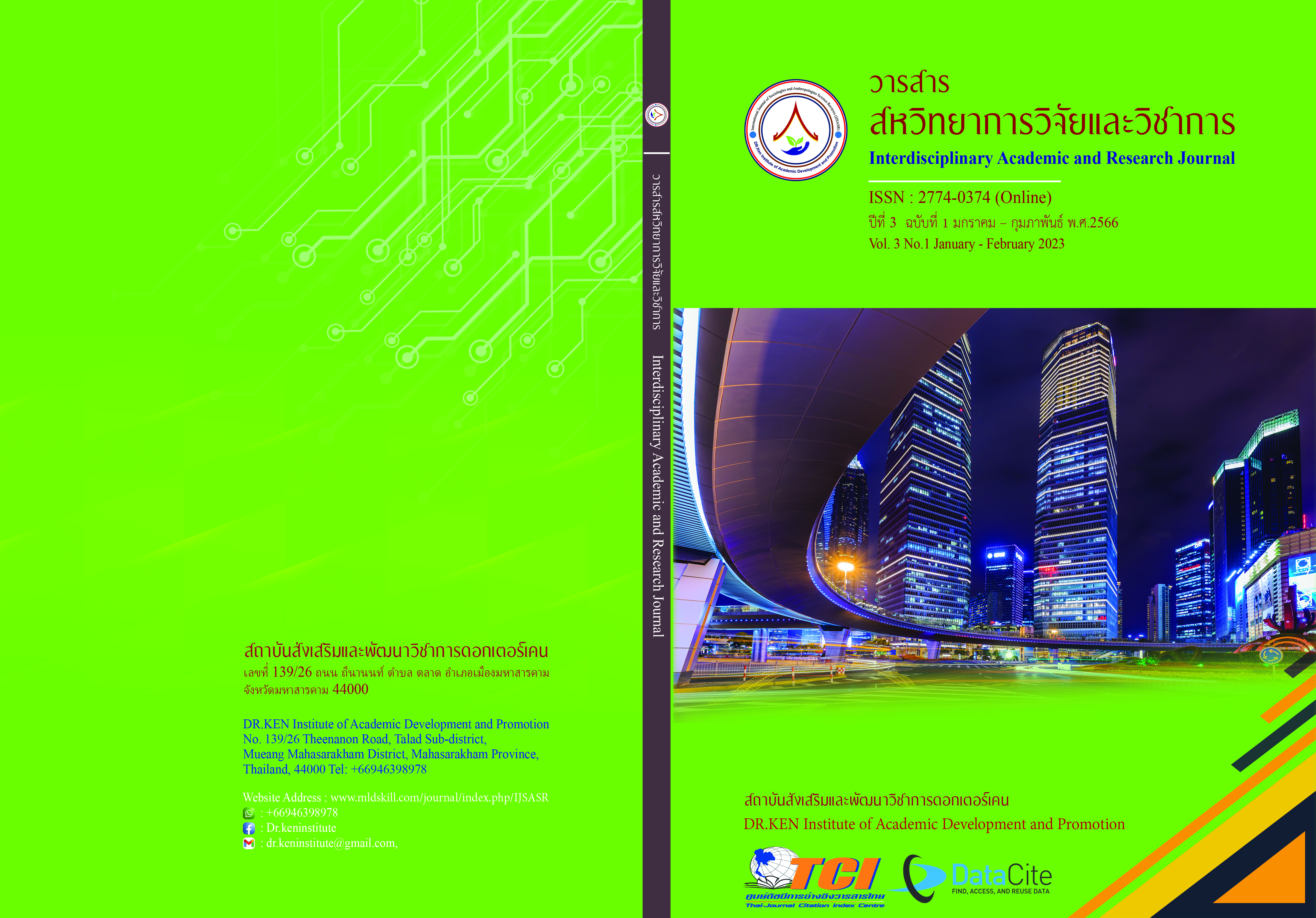School Administration using the 4 Power Principles of School Administrators under the Office of Buriram Secondary Education Service Area
DOI:
https://doi.org/10.14456/iarj.2023.22Keywords:
Administration; , School ;, 4 Power PrincipleAbstract
According to the current state of society, technological progress has resulted in material prosperity. Thoughts, values, and environments have changed, causing the school administration to adapt to keep pace. To succeed in the administration, it is necessary to apply the Dhamma principle, which is the 4 Power Principle (Idthibat 4), to be used in the administration of the school to achieve success in administrative work. Therefore, the research on school administration using the 4 Power Principal of school administrators under the Buriram Secondary Educational Service Area Office has objectives. (1) To study school administration using the 4 Power Principal of school administrators under the Buriram Secondary Educational Service Area Office. (2) To compare educational institute administration using the 4 Power Principle of educational institute administrators under the Buriram Secondary Educational Service Area Office classified by age, work experience, and size of institutes. The sample consisted of 344 school personnel under the Buriram Secondary Educational Service Area Office. The research tool was a questionnaire. The statistics used to analyze the data were frequency, percentage, mean, and standard deviation, and the statistics used to test the hypothesis were t-test, and F-test. The results showed that (1) The school administration using the 4 Power Principles of school administrators under the Buriram Secondary Educational Service Area Office overall was at a high level. School administrators were at a high level in all aspects. (2) The school administration using the 4 Power Principles of school administrators under the Buriram Secondary Educational Service Area Office classified by age, work experience, and overall size of the school was not different.
References
บุญชม ศรีสะอาด. (2556). การวิจัยเบื้องต้น. พิมพ์ครั้งที่ 9. กรุงเทพฯ : สุวีริยาสาส์น
พระจิตกร กิตฺติปญฺ โญ (สินอินแก้ว). (2559). การส่งเสริมการบริหารสถานศึกษาตามหลักอิทธิบาท 4 ในสถานศึกษาขั้นพื้นฐาน อำเภอศรีธาตุ สังกัดสำนักงานเขตพื้นที่การศึกษาประถมศึกษาอุดรธานีเขต 2. วิทยานิพนธ์พุทธศาสตรมหาบัณฑิต, บัณฑิตวิทยาลัย: มหาวิทยาลัยมหาจุฬาลงกรณราชวิทยาลัย.
พระพนมพร ชินวํโส (อินทร์มาลา). (2557). การบริหารสถานศึกษาตามหลักอิทธิบาท 4 ในสถานศึกษาขั้นพื้นฐาน สังกัดสำนักงานเขตพื้นที่การศึกษาประถมศึกษา มหาสารคาม เขต 3. วิทยานิพนธ์พุทธศาสตรมหาบัณฑิต. บัณฑิตวิทยาลัย: มหาวิทยาลัยมหาจุฬาลงกรณราชวิทยาลัย.
พระอภินันท์ กนฺตสีโล (สิงมาดา), สุนทร สายคา และเจ้าอธิการบุญช่วย โชติว โส. (2561). การบริหารสถานศึกษาตามหลักอิทธิบาท 4 ในสถานศึกษาขั้นพื้นฐาน อำเภอนาดูน สังกัดสำนักงานเขตพื้นที่การศึกษาประถมศึกษา มหาสารคาม เขต 2. มหาวิทยาลัยมหาจุฬาลงกรณราชวิทยาลัย วิทยาเขตขอนแก่น.
พุทธทาสภิกขุ. (2557). ศึกษาธรรมะอย่างถูกวิธี. Retrieved on 10 January 2014 from : http://www.buddhadasa.com/rightstudydham/itibath4.html.
มัณฑนา ปรียวนิตย์.(2553). “การบริหารโรงเรียนวิถีพุทธตามหลักอิทธิบาท 4 สังกัดสำนักงานเขตพื้นที่การศึกษาประถมศึกษานนทบุรี เขต 1”. วิทยานิพนธ์พุทธศาสตรมหาบัณฑิต สาขาวิชาการบริหารการศึกษา. บัณฑิตวิทยาลัย: มหาวิทยาลัยมหาจุฬาลงกรณราช วิทยาลัย.
สำนักงานเขตพื้นที่การศึกษามัธยมศึกษาบุรีรัมย์. (2564). แผนปฏิบัติการประจำปีงบประมาณและข้อมูลสารสนเทศ. บุรีรัมย์ : กลุ่มนโยบายและแผน, 2564.
สำนักงานปลัดกระทรวงศึกษาธิการ. (2552). นโยบายสถานศึกษา3D เกณฑ์มาตรฐานคุณภาพสถานศึกษา 3D และเกณฑ์มาตรฐานคุณภาพสำนักงานเขตพื้นที่การศึกษา 3D. กรุงเทพฯ : อักษรไทย.
หทัยพร พรหมเทศ. (2557). การบริหารงานวิชาการตามหลักอิทธิบาท 4 ของสถานศึกษาสังกัด องค์การบริหารส่วนจังหวัดมหาสารคาม. วิทยานิพนธ์พุทธศาสตรมหาบัณฑิต, (บัณฑิตวิทยาลัย: มหาวิทยาลัยมหาจุฬาลงกรณราชวิทยาลัย), หน้า 117-119.
Krejcie, R. V. & Morgan, D. W. (1970). Educational and psychological measurement. Determining Sample Size for Research Activities. 30(3), 607-610.
Downloads
Published
How to Cite
Issue
Section
License
Copyright (c) 2023 สมเจตน์ ยืนยง

This work is licensed under a Creative Commons Attribution-NonCommercial-NoDerivatives 4.0 International License.
Copyright on any article in the Interdisciplinary Academic and Research Journal is retained by the author(s) under the under the Creative Commons Attribution-NonCommercial-NoDerivatives 4.0 International License. Permission to use text, content, images, etc. of publication. Any user to read, download, copy, distribute, print, search, or link to the full texts of articles, crawl them for indexing, pass them as data to software, or use them for any other lawful purpose. But do not use it for commercial use or with the intent to benefit any business.
















.png)


